
LDS Moapa Stake Office Building, also known as the Virmoa Maternity Hospital, is listed on the National Register of Historic Places in Overton, Nevada. It was built between 1917 and 1919 to serve the community of Moapa Valley as a local office, classroom and records repository for the LDS Church. In 1939, the local stake decided to relocate their offices to Las Vegas as travel between the communities became easier. The building then sat vacant.

The Torrey Log Church–Schoolhouse was built in Torrey, Utah in 1898 as a LDS meetinghouse and schoolhouse. The one story log structure served as the school until 1917, and as a meetinghouse until 1928.

Built in 1909, the Murray LDS Second Ward Meetinghouse is a historic building in Murray, Utah, United States. It was listed on the National Register of Historic Places in 2001. The building is significant for its association with the history and development of Murray between 1909 and 1950.

The Wasatch Stake Tabernacle in Heber City, Wasatch County, Utah, USA was completed in 1889, and served as a Latter Day Saints meetinghouse reserved for especially large congregations until 1965. The tabernacle, which has a capacity of 1,500 in its pews, was added to the National Register of Historic Places in a joint listing with the adjacent Heber Amusement Hall on December 2, 1970.

The Provo Tabernacle served as a tabernacle of The Church of Jesus Christ of Latter-day Saints from 1898 to 2010 in downtown Provo, Utah, United States. It is a historic icon of Provo and has been home to many religious and cultural events. All but the outer walls of the building were destroyed by fire in December 2010. The Church of Jesus Christ preserved the remaining outer walls and built a new foundation and interior as part of the Provo City Center Temple, completed in 2016.

In The Church of Jesus Christ of Latter-day Saints, a tabernacle is a multipurpose religious building, used for church services and conferences, and as community centers. Tabernacles were typically built as endeavors of multiple congregations, usually at the stake level. They differ from meetinghouses in scale and differ from temples in purpose.
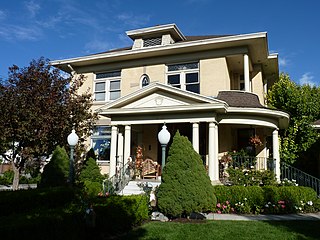
The Thomas N. Taylor House is a historic house located at 342 North 500 West in Provo, Utah. It is listed on the National Register of Historic Places.
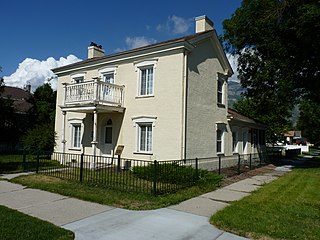
The Clark–Taylor House is a historic building located in Provo, Utah, United States. It is listed on the National Register of Historic Places. It has also been known as the T. N. Taylor Home. One of the oldest pioneer buildings in the state, the Clark–Taylor House was built around 1854. Thomas N. Taylor, a Provo Mayor, LDS bishop, and stake president, along with being a chairman of the board of trustees of BYU, lived in this home. The Clark–Taylor House was designated to the Provo City Historic Landmarks Registry on March 7, 1996.
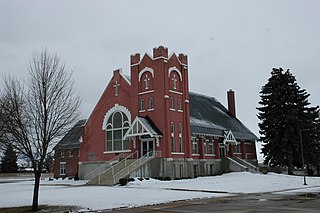
The Malad Second Ward Tabernacle is a tabernacle and meetinghouse of The Church of Jesus Christ of Latter-day Saints located in Malad City, Idaho. It is significant for its large scale and unorthodox adaptation of architectural styles, as well as its historical importance to Oneida County, which once was among the most populated counties in Idaho. It is, along with six other buildings in Oneida County, listed on the National Register of Historic Places.
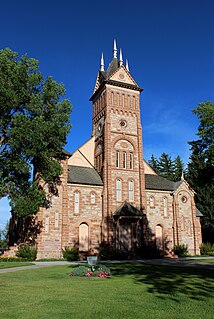
The Bear Lake Stake Tabernacle, situated on main street in Paris, Idaho, is a Romanesque red sandstone meetinghouse of The Church of Jesus Christ of Latter-day Saints designed by Joseph Don Carlos Young, the son of Brigham Young. The tabernacle was built between 1884 and 1889 by Mormon pioneers of Bear Lake Valley who used horse and ox teams to haul rock quarried from Indian Creek Canyon nearly 18 miles away. After the completion of the Logan Utah Temple in 1884, the workers began construction of the tabernacle. It cost $50,000 to build and seats around 2000 people.

The current Box Elder Stake Tabernacle, also known as the Brigham City Tabernacle, is a neo-Gothic tabernacle of The Church of Jesus Christ of Latter-day Saints rebuilt in Brigham City, Box Elder County, Utah by Mormon pioneers in 1897 after being gutted by fire a year earlier. The tabernacle continues to function as a meetinghouse for congregants of the Box Elder Stake and seats approximately 1600. It also host concerts and other special events and is open for tours during the summer. Given its unique architecture and importance to the community, the tabernacle was listed on National Register of Historic Places on May 14, 1971. A recently built temple stands across from the tabernacle.

The Summit Stake Tabernacle or "Coalville Tabernacle" was a meetinghouse of The Church of Jesus Christ of Latter-day Saints located in Coalville, Summit County, Utah.

The Randolph Tabernacle is a Victorian-styled meetinghouse for the Randolph Ward (congregation) of The Church of Jesus Christ of Latter-day Saints and is located in Randolph, Rich County, Utah. It was listed on the National Register of Historic Places on April 10, 1986.

The Wellsville Tabernacle was built as a Gothic Revival-styled meetinghouse of The Church of Jesus Christ of Latter-day Saints and is located in Wellsville, Cache County, Utah. It was listed on the National Register of Historic Places on November 26, 1980.
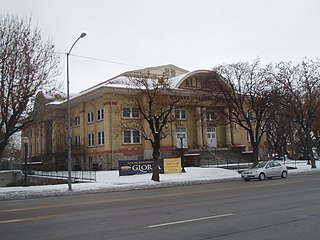
The Alpine Stake Tabernacle or Alpine Tabernacle, located at 110 East Main Street (US-89) in American Fork, Utah, United States, functions as a meeting place for large gatherings of members of The Church of Jesus Christ of Latter-day Saints in northern Utah County for worship services. The building is part of the American Fork Historic District listed on the National Register of Historic Places.
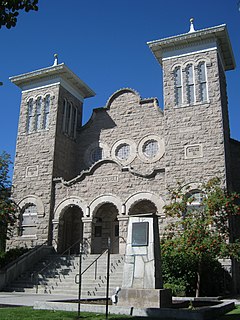
Otto Bernhard Erlandson was a Swedish-American builder and architect in the Intermountain West in the early-20th century. Erlandson was born a son of Elias and Kjersti (Lundstett) Erlandson in Malmo, Sweden. His brother was Henry Erlandson. The family emigrated to Utah Territory with his parents and siblings in 1870 as converts to The Church of Jesus Christ of Latter-day Saints. He was schooled in Payson, Utah and took mechanical drawing classes at Utah State University.

The Blackfoot LDS Tabernacle, also known as the Blackfoot Tabernacle or South Blackfoot Stake Tabernacle is a building located in Blackfoot, Idaho that formerly served as a tabernacle for large gatherings of members of The Church of Jesus Christ of Latter-day Saints. The tabernacle was designed by architects Hyrum Pope and Harold W. Burton and completed in 1921. The building was listed on the National Register of Historic Places in 1977. In 1980 the church sold the building to the city of Blackfoot. It was used as a civic auditorium until the 90's and sat until 2003. In 2003 local business owner Perry Hawker bought it and it now functions as the Hawker Funeral Home.

The Parowan Meetinghouse, sometimes referred to as the Parowan Tabernacle or the Parowan Old Rock Church is a historic meetinghouse of The Church of Jesus Christ of Latter-day Saints in Parowan, Utah, United States, that is listed on the National Register of Historic Places (NRHP).

The Granite Stake Tabernacle is a tabernacle of The Church of Jesus Christ of Latter-day Saints in the Sugar House District of Salt Lake City, Utah, United States. It has historic significance to the area and was listed in the U.S. National Register of Historic Places in 2003.

The LDS Stake Office Building in Paris, Idaho was built in 1910. It was listed on the National Register of Historic Places in 1982.






















